- Pressure on Buhari for reform on federalism in Nigeria
By SUNDAY ODIBASHI
The advocacy for restructuring of Nigeria’s cheqered federalism has continued to deepen the gulf between the North and the South, generating strong consciousness and bonding among micro ethnic nationalities. The restructuring debate further realign political and state actors into respective monolithic forces, dissolving partisan political parties’ boundaries, including ethnic demarcations, in the North/South dichotomy. All identifiable majority, minority political climes have become assimilated in the North/South divide as the struggle for power reconfiguration gains momentum across Nigeria. The body politic is currently bifurcated into North and South stakeholders contesting a new power equation in the Nigerian nation-state.
It is bizarre that after about two years of the democratic regime under the All Progressives Congress (APC), the Nigerian polity is beclouded with agitations which snowballed into further agitations for restructuring of Nigeria’s federalism.
In the 16 years of the Peoples Democratic Party (PDP) regime, two agitations from the North were visible. The first was the introduction of Sharia law in Zamfara State by Governor Sani Yerima of the All Peoples Party (APP) which, unfortunately, triggered violent protests in some other northern states at the early time president Olusegun Obasanjo was in office. Obassanjo, then, deployed his leadership sagacity to contain the spread of the Sharia Law violence which, ironically, were only carried out in states controlled by the PDP; yet, the Sharia Law was not a PDP policy.
The other violent uprising was the Boko Haram insurgency, which also got to the climax during the President Umar Musa Yar’Adua administration.
The Niger Delta militants were bequeathed to the emergent democratic regime by the military.
The Niger Delta Avengers (NDA) reactivated militant activities at the early stage of President Muhammadu Buhari administration. This has, since subsided.
The Indigenous People of Biafra (IPOB) took up agitations for Sovereign State of Biafra, relegating MASSOB to the background under the APC government. There is also agitation for Oduduwa Republic.
Before the IPOB agitations gained currency, Fulani herdsmen were on rampage, invading communities, killing people and destroying property at will without government intervention. The only exception, perhaps, was the gruesome killings in Southern Kaduna which generated wide outburst across the country before the federal government could rise to its duty.
Apparently, there were rising mutual suspicions and distrusts across the country. More so, there were agitations over federal appointments by President Buhari, which many stakeholders perceived as lopsided in favour of the North.
Accordingly, the renewed advocacy for restructuring, which was relatively silent in most parts of PDP 16 years, has been generating questions over the use of federal powers under the APC government. What has become the obvious is that Buhari is neither the problem nor the APC; the structure is perceived to have inherent indices of disequilibrium and inconsistencies.
The contentious issues have been revolving around devolution of powers, fiscal federalism, equality of states among the six geo-political zones, etc.
Southern leaders, who include Chief Ayo Adebanjo, Professor Ben Nwabueze, Chief Edwin Clarke, Dr. Fredrick Fasehun, yinka Odumakin, among others, have complained vehemently about unfair treatment and unequal share of the country’s resources by the Buhari administration, which they argued take away a huge portion of derivatives from the South to the North, concluding that the South is being marginalized by the Buhari administration.
On the other divide, the Arewa Consultative Forum (ACF), representing northern interests, contended that most of the allegations against the North by the Southern leaders, especially, marginalization, were not based on facts.
The Forum at a National Executive Council (NEC) meeting in Kaduna, penultimate week, complained that allegations of marginalisation by the southern Nigeria against the North has created anxiety, fear and mistrust among Nigerians.
Muhammad Ibrahim Biu, ACF spokesman, had in a communique revealed that the Forum resolved to set up a committee on restructuring which would examine all aspects and suggest a common perspective on the interest of the North within the Nigerian project.
The ACF maintained that the restructuring of the country should be aimed at enhancing unity, peaceful coexistence, stability and balanced development of the country as well as ensure social justice, fairness and equity to all.
Sautner leaders also held their meeting recently, where they resolved on true federalism and devolution of powers.
The non-state actors on both sides reinforce the state actors who have been drawn into the restructuring movement.
Governors of the Southern States, on Monday, met in Lagos, where they unanimously reiterated the call for true federalism and devolution of powers to states.
The Governors, in a communique at the end of the meeting read by the host Governor, Mr. Akinwunmi Ambode of Lagos State, also resolved to collaborate with one another for the growth and development of their economies.
The meeting was attended by Governors of Ogun, Senator Ibikunle Amosun; Oyo, Seantor Abiola Ajimobi; Osun, Ogbeni Rauf Aregbesola, Ebonyi, David Umahi; Edo, Godwin Obaseki; Ondo, Arakunrin Oluwarotimi Akeredolu; Abia, Okezie Ikpeazu; Enugu, Henry Ugwuanyi; Bayelsa, Seriaki Dickson and Ekiti State, Ayodele Fayose.
Governors of Cross River, Anambra and Delta were represented by their Deputies – Evara Esu; Dr. Ikem Okeke and Kingsley Otuaru, respectively.
Continuing with the communique, Governor Ambode said the Governors after extensive deliberations, also emphasized priority on security and lives and property of citizens of the regions, while also resolving to work on effective linkage on good infrastructure across the 17 States in the region.
At the meeting, Governor Ambode was unanimously appointed as the Chairman of the Southern Governors Forum (SGF) while Governors Seriaki Dickson of Bayelsa and David Umahi of Ebonyi States were appointed as Co- Chairmen of the Forum.
The Forum also scheduled the next meeting for Port Harcourt in a yet to be announced date.
Earlier, Governor Ambode, while welcoming his colleagues to the meeting, reflected on the clamour for true federalism and devolution of powers, saying that states will benefit from the envisaged restructuring.
He said the goals of true federalism, which included the strengthening of autonomy and the enhancement of fiscal viability will enable the states to develop at their own pace and based on their peculiarities.
He said the forum had achieved an increased awareness on the sustenance of the national question germane to peaceful co-existence in the country.
However, he said there is a lot to be done and achieved, stressing that true federalism required urgent, meticulous and proactive attention by the forum.
Ambode frowned at what he described as the non-periodic review of the revenue formula as provided by the constitution to reflect evolving realities.
He said the review is crucial to enhance the viability of states and local government and their capacity to fulfil their developmental roles in the polity.
The governor added: “States are disparaged for always carrying begging bowls to Abuja in quest of hand-outs from the Federal Government. This is a function of our present national constitution that burdens the Federal Government with activities and responsibilities that rightly fall within the province of states.
“The productivity and revenue-generating capacities of most states are thus stifled, thus turning them into no better than street beggar states incapable of even meeting routine obligations of paying workers’ salaries and pensions without federal support.”
Ambode recalled that Lagos State had fought and won several legal battles since 1999 that have systematically strengthened her autonomy and enhanced her fiscal viability.
He noted that the state had won the legal control over the management of its environment, the control of urban and physical planning, the regulation of overhead masts, the registration and regulation of hotels and restaurants, and the control of inland waterways.
Ambode said these victories belonged, not only to Lagos, but also to other states, adding that, if Lagos could achieve so much by fighting alone, the Southern Governors’ Forum will accomplish more through collective planning and strategy.
The governor said the forum has been reactivated at the time the National Assembly is harmonising its differences over the 1999 Constitution amendment, which will soon be transmitted to the Houses of Assembly for approval
He said: “It is important for this forum to comprehensively look at the proposed amendments with a view to working with our respective Houses of Assembly to ensure a coordinated response on our part that will strengthen the practice of democracy, federalism, constitutionalism and the rule of law.
Ambode clarified that, while pushing for greater devolution of powers, responsibilities and resources from the centre to the states, the goal of the forum is neither to a weak centre and strong states and vice versa.
The governor paid tribute to former Lagos State Governor Bola Tinubu for his initiative, recalling that he hosted the first meeting of the forum in Akodo Beach Resort, Ibeju-Lekki, whe he was at the helm of affairs.
He said while the initiative was received with mixed feelings at the time, Tinubu was vindicated later because of its achievements as the forum became a vocal voice on matters of critical importance, not only to the Southern Nigeria, but to the country as a whole.
Ambode commended the forum for advocating for a special allocation to oil-producing states in the Federation Account, adding that its agitation led to the current 13 per cent revenue derivation and allocation from the Federation Account.
He said: “Another major victory won towards strengthening the country’s practice of true federalism was the declaration by the Supreme Court in 2002 that the then prevalent practice of the Federal Government deducting monies from the Federation Account as a first charge for the funding of Joint Venture Contracts, the NNPC priority projects, servicing of Federal Government’s external debt, the judiciary and the Federal Capital Territory (FCT) and other federal obligations were illegal and unconstitutional.
“The Supreme Court in that case abolished the special funds created by the Federal Government to enable it draw funds from the Federation Account to pay for matters that fell within its exclusive responsibility before sharing whatever was left with states and local governments.”
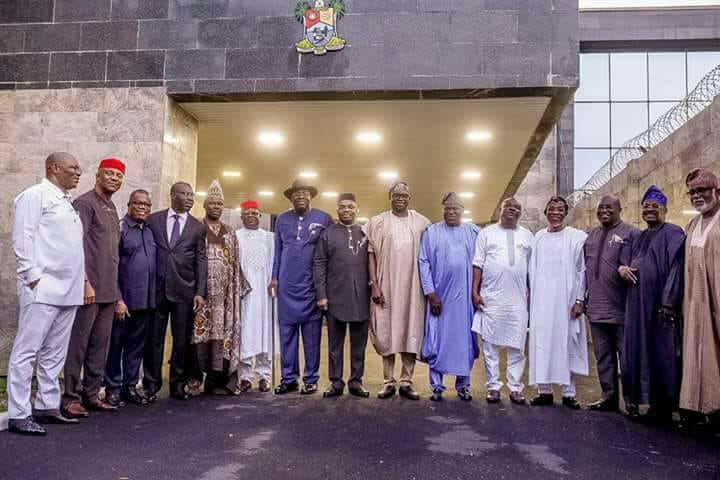
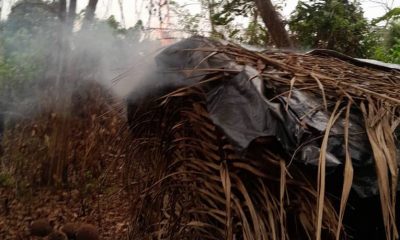



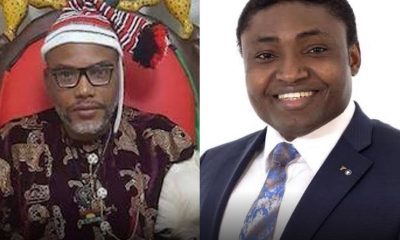

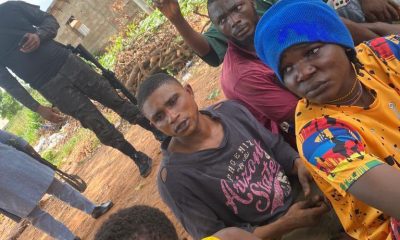

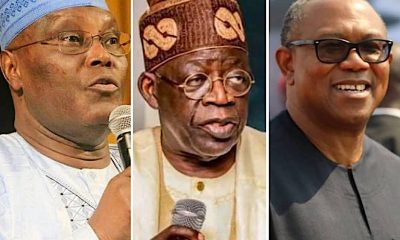




 Comments and Issues2 days ago
Comments and Issues2 days ago
 Business6 days ago
Business6 days ago
 Business1 week ago
Business1 week ago
 Business1 week ago
Business1 week ago
 Business5 days ago
Business5 days ago
 Education7 days ago
Education7 days ago
 Comments and Issues5 days ago
Comments and Issues5 days ago
 News6 days ago
News6 days ago


